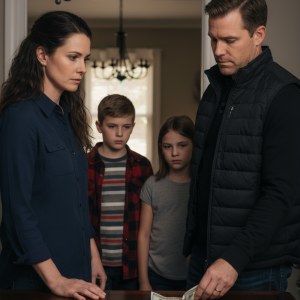People say one moment can change how you see your whole past. For me, that moment was August 3rd—the day I married Emily. Forty-three guests, soft jazz humming in the background, and Emily looking like something out of a dream. I’d spent years grinding—late flights, sleeping on airport benches, pulling double shifts—just to build the life I wanted. That day was meant to be a celebration.

Bethany, my younger sister, didn’t see it that way. She strolled in after the vows, wearing a gold backless dress like she was auditioning for a reality show, grabbed champagne, and kept her distance. When our eyes met, she looked straight through me, as if I was a stranger.
Three weeks earlier, she’d called in tears about her car dying—again. She’d already borrowed $1,200 in April, and now she wanted money for a replacement. I said no. Not because I couldn’t help, but because I was tired of being her safety net. She’d been skipping classes, partying, and telling our parents she was “finding herself.” I didn’t think she’d carry that resentment into my wedding.
She waited until the toasts. Just as I began thanking our guests, Bethany stood, raised her glass, and flung champagne across the dessert table. The spray shattered a framed photo of me and Emily. Then she shoved the wedding cake—three delicate tiers—onto the floor.
Her voice cut through the stunned silence: “This is what you get for thinking you’re better than us!” My mom rushed to her side, holding her like she’d just survived a tragedy. “She just needs to vent,” she told me. Emily’s parents looked horrified. Bethany didn’t cry—she just walked out, satisfied.
I didn’t shout. I didn’t chase her. Instead, I smiled at Emily, whispered something only she could hear, and let the coordinator salvage what was left of the night. But in my mind, the wheels were already turning.
Back home, while Emily changed out of her gown, I opened my laptop. I revoked the $9,400 tuition payment I’d made for Bethany and froze the lease account I’d co-signed. Rent was due in five days. By 8:40 the next morning, she’d discovered both.

Her texts came fast—confusion, then anger: Fix this. Now. I made coffee instead. My mom left a voicemail: “Your sister feels abandoned. Call me.” No one had ever called to check on me when I paid her bills.
Bethany started showing up at my apartment. Emily refused to let her in. When Bethany tried to slip inside one evening, Emily physically escorted her back into the hallway and told her if she tried again, the police would be called.
My dad called, urging me to “be the bigger person.” I told him I’d already been that person for years. In a family group chat, Bethany claimed she’d only acted out because she felt “invisible,” and my mom insisted it was time to forgive. Emily left the chat without a word.
Soon after, I learned Bethany had left her apartment and re-enrolled in school—this time, my parents paid her tuition themselves. So much for “we can’t afford it.” That night, I told Emily it felt like a decade-long weight had been cut loose.
Bethany’s “big plans” turned out to be a podcast: Bloodline Bruises: Growing Up with the Golden Child. The trailer was filled with dramatic lines about “toxic family” and “surviving betrayal.” Then she emailed me, asking to meet. Emily immediately said, “She’s setting a trap.”
Three days later, my parents showed up uninvited, urging me not to “take the podcast personally” and saying Bethany wanted a relationship. I asked if they’d ever told her what she did was wrong. They said she’d been “overwhelmed.” That told me everything.
Emily and I booked two tickets to the Maldives. No family, no drama—just peace. We didn’t mention Bethany until the fourth day, when Emily asked if my parents would ever admit the truth. “No,” I said. “But they know.”
Her podcast fizzled after a few episodes. My mom stopped sending group texts. We moved to a better home, farther from the city, and never looked back. Sometimes, you don’t put out a fire—you let it burn until there’s nothing left, and then you walk away, finally warm.





